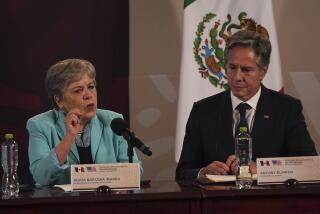Mexico Rebels See U.S. as Key to Peace Agreement
SAN CRISTOBAL DE LAS CASAS, Mexico — The southern rebels here acknowledged Wednesday that they are relying on international pressure--particularly from the United States--to enforce the peace agreement they are now negotiating with their government.
“The U.S. government is going to pressure the Mexican government to make changes in order to prevent these kinds of movements from arising,” said Subcommander Marcos, the spokesman for the rebels who took control of several towns in southern Mexico on Jan. 1.
The rebels, who call themselves the Zapatista National Liberation Army, quickly withdrew from the towns but still control large tracts of jungle in eastern Chiapas, a Mexican state on the Guatemalan border.
Marcos said he expects the United States to support the Zapatistas once U.S. intelligence agencies are convinced the movement is not influenced by Cubans or Russians.
“Finally, they are going to conclude that this is a Mexican problem, with just and true causes, and they will have to speak out because this affects U.S. security,” he said, adding: “We are not talking about communism versus capitalism. We are talking about life or death.”
International pressure was largely credited with pushing the government to declare a cease-fire on Jan. 11 and to invite the rebels to the negotiating table.
Late Wednesday, negotiators said they had agreed on issues of health care, education, housing, true and timely information and respect for Indian cultures and traditions; no specifics were provided.
Earlier, in a news conference with radio reporters before the third day of talks began, Marcos and 18 rebel delegates outlined their proposals for enforcing a peace pact and their objections to the North American Free Trade Agreement, which they said harms poor Mexican farmers.
More to Read
Sign up for Essential California
The most important California stories and recommendations in your inbox every morning.
You may occasionally receive promotional content from the Los Angeles Times.










